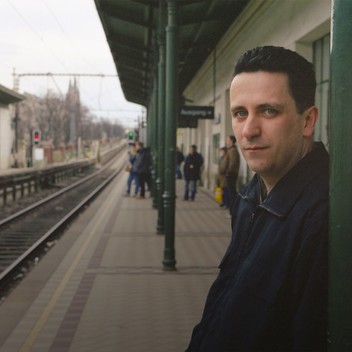Concert
My Eyes Glaze Over (label MEGO) 1

For the past decade, the Italian composer and musician Caterina Barbieri has been developing electronic music that is unique: full of life and spiritually powerful. As part of the festival ManiFeste-2024, she has participated, together with Gisèle Vienne and Isabelle Piechaczyk, in the programming of the series of concerts My Eyes Glaze Over: A Tribute to Peter Rehberg. She tells us about this prolific composer, former director of the label Editions Mego, and major figure of the electronic scene and computer music that emerged in the 90s.
After a few e-mail exchanges, we ended up meeting in Vienna in 2018 for a concert that I was giving there. He immediately was very welcoming. He first invited me to this place, where he kept a massive collection of albums, then to his favorite pub, a very humble and unostentatious place that he visited frequently. The following year, his label Editions Mego was publishing my fourth album, Ecstatic Computation. From then on, we had a friendly relationship, even though I unfortunately only met him in the last years of his life. We often saw each other in Vienna or Berlin, where he spent part of his year at the time.
He did like to build a strong relationship with most of the artists he worked with. He wished to have both a professional and friendly relationship, that he always kept frank, forthright, and transparent. This is something that I find quite rare in today’s music industry, although the underground scene still somehow manages to maintain this more humanistic dimension. I truly admired this aspect of his personality and maybe even more than that, his constantly insatiable curiosity. Despite his legendary work and his respect for the early electronic music pioneers, he continued to avidly follow the evolution of the scene and was receptive to new trends, always curious about young artists. That is probably the reason why we became friends. He was also generous with his advice, and often served as a mentor to me. All of this inspired me a lot and fueled me to create my own label, light-years. I do not think I would have embarked on such an adventure without him, and for that, I am very grateful. He was also someone who liked to share his knowledge: he often sent me albums that he recommended me to listen to.
Yes, even though we were from different generation. Peter and were more than twenty years apart. My own music owes him a lot. Towards 2006-2010, when I was younger, still living in Bologna, Italy, and had only just started attending concerts, I discovered and was deeply influenced by many artists of the computer, experimental, and electronic music produced by the Mego label. First, by Peter’s own albums, that he signed under the name ‘Pita’, and especially his series Get Out (1999) and Get In (2016) which were very abstract and inspired by the glitch aesthetic. Then of course Summer (2001) by the Viennese musician Christian Fennesz, which remains for me an iconic album that is emblematic of this era. I was also deeply marked by Oneohtrix Point Never’s Returnal, which contributed to composer Daniel Lopatin’s international fame. Not to mention Quantum Jelly (2012) by my brother in arms Lorenzo Senni, which launched the beginning of his career. Peter Rehberg always had this talent for discovering young artists that would later occupy a central position on the international scene.
Propos recueillis et traduction réalisée par Pauline Destouches.